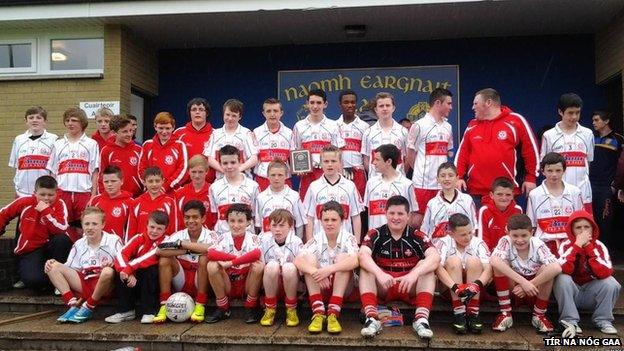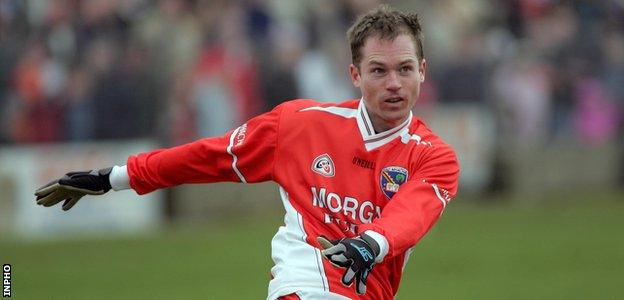Slipping through the cracks: Tír na nÓg GAA club needed for more than just sport
- Published

Tír na nÓg have 16 teams across all age groups
Tír na nÓg GAA club chairman Dessie Henderson would argue that now is the time when his club is at its most valuable.
Community has always been the fabric of the GAA, and for Armagh club Tír na nÓg that community is Portadown.
In the midst of a pandemic, Henderson says the role of his club is clear: to lead the support network in the local area, doing whatever can be done to help those struggling.
"Yes there are negatives in the fact that we are not playing any games, but there are also positives in that we have injected enthusiasm into the community," says Henderson.
"On-field activity and social club activity is non-existent.
"However we have been active on social media, where every week we are engaging our members and engaging our community in various activities.
"We have ran talent competitions, skill-based competitions and we raised over £4,000 just last week for four charities within the local area by collectively doing over 5,000km of walking."
The GAA was one of the first sporting bodies to announce a blanket ban on all activity after Taoiseach Leo Varadkar imposed restrictions on indoor and outdoor gatherings on 12 March.
Two months on and as Ireland begins to move out of lockdown towards a 'new normal', the GAA is confronted by a process that offers little reassurance for an organisation whose heartbeat is found in the grassroots.
Grants scheme terms see Portadown GAA club missing out on badly needed funds
The Association's President John Horan has admitted that, while social distancing guidelines remain in place, it is difficult to see how amateur games can be played.
For clubs like Tír na nÓg the prolonged period of inactivity creates a danger of financial problems, which will in turn translate into how, if at all, the club is able to run.
"We have absolutely no income whatsoever," explains Henderson.
"There is no opportunity to get anybody into the social club and we cannot ask businesses for sponsorship because there is nothing happening.
"As problematic as it is at the moment, it's also going to be problematic going forward in the short to medium term.
"For us at grassroots level who are involved in the game on a daily basis, the prospect of not being able to play competitive games or get involved with bringing young people together is a concern.
"We understand the reasons as to why we are in the position we are in, because there are people's live at stake.
"But also we have to balance that out with a society that is able to operate in some form of normal circumstance."
Club's importance cannot be measured by rateable value
Tir na nÓg's rateable value fell around £3,000 short of the Northern Ireland Executive's retail, tourism and hospitality grant, which would have provided them with £25,000.
With 350 members and 16 teams, the Portadown club are arguing that their reach within the community ought to be taken into account when grants are being awarded.
While they received £2,000 from the sport Hardship Fund, Henderson says that with no definitive end date in sight, enhanced funding will be required if the club, and many more like it, are to make it through the crisis.
"Unless government sees sporting organisations, and I'm talking about all sports, as part of the solution and ensures that they are able to sustain their activities then I think we've got a problem.

Armagh All-Ireland winner Andrew McCann is a former club player
"We are concerned about the wellbeing both physically and mentally of our players, and we need the government to invest in that.
"If clubs fold or cannot sustain what they're currently doing, there is going to be a major problem for wellbeing going forward."
As it stands most sports clubs cannot avail of the £10,000 coronavirus support grant, while there has been no confirmation as to how much a body can receive from the micro-business support scheme.
"The small business grant is based solely on rateable value, but that doesn't indicate the importance of a club like our's to our community," says Henderson.
"Things like that need to be taken into account for sporting organisations because we make a major contribution to the way of being in our community.
"There should be more criteria about that in terms of grants for clubs.
"Clubs going forward are going to need help both in terms of grants and also in terms of rates and other bills coming in."
GAA family 'stronger' for the crisis
The situation is such that when society can return to some form of normalcy, Henderson believes it will do so with the scars of the coronavirus pandemic permanently on show.
Times like these require community and that, says Henderson, is why the club requires financial support to see it through the crisis.
"Society in general will change, our club will change," Henderson predicts.
"I think we have strengthened the community support through the pandemic in the fact that we have brought a lot of people into our activities by doing them online.
"As a GAA family within this area I think we have made it a lot stronger."